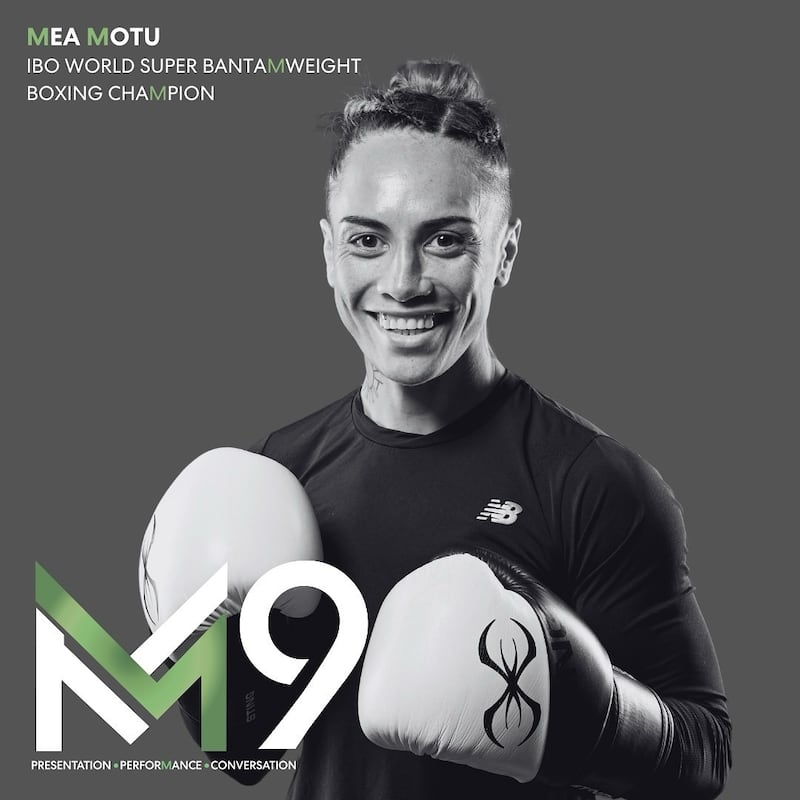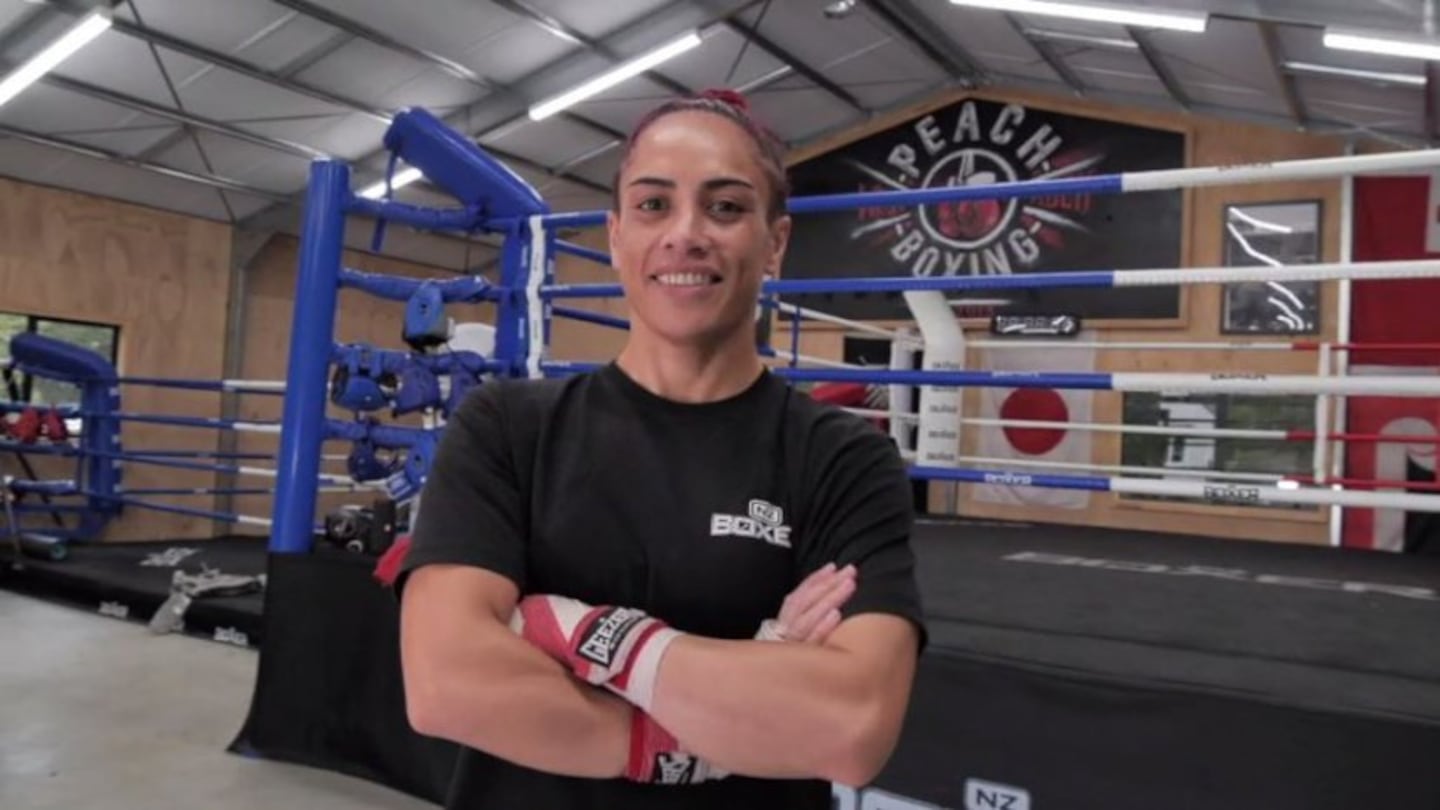This article was first published by Stuff.
When it comes to sharing her story in the hope of helping others, world bantamweight champion boxer Mea Motu doesn’t pull any punches.
Speaking through tears, Motu, 34, recalls how 10 years of domestic violence at the hands of her ex-partner left her traumatised and broken.
“I distanced myself from my family, my friends and lost who I was. I lost confidence. I lost trust. I hated the world. I just felt like I had nothing worth living for,” Motu said.
“It was my children and being reminded of where I come from that kept me going and kept me alive.”
Now a five-time national boxing champion, and the current IBO World Super Bantamweight titleholder, Motu (Te Rarawa) is one of Aotearoa’s most successful athletes.
On November 21, she will be one of nine powerful speakers welcomed on to the M9 stage at Kiri Te Kanawa Theatre in Tāmaki Makaurau to tackle the pātai, the question: What does it mean to be a Māori athlete?
For Motu, the answer comes quickly: “It’s greatness. It means being proud to be Māori, proud of where I whakapapa back to and that I make my ancestors proud. That’s what it means to me.”

This sense of pride was instilled from a young age, Motu said, but it was something she struggled with after moving to Tāmaki Makaurau Auckland at the age of 12.
“My upbringing was beautiful. I grew up in Pukepoto on Te Rarawa Marae most of the time. That was my most happiest memory. I was this tough little girl, running around in the paddocks, being proud of who I am.
“I feel like I’m right there - as a little 10-year-old girl standing right in front of [Te Rarawa Marae], looking at all the carvings and feeling my ancestors surrounding me. It’s empowering.”
She remembers a childhood living off the land, bare feet, “touching the earth and feeling the soil”.
“It was a beautiful place. I thought of everyone in my home-town as my cousins. I loved going out pig hunting, horse riding and catching my own kaimoana,” Motu said.
“I was surrounded by family and we spoke te reo Māori which was normal to me as a kid. I hated leaving home.
“So then when I came to Auckland and I was being myself, having no shoes because that’s what I liked, and wearing rough clothes, society kind of shamed me and made me feel embarrassed,” she said.
Motu said because everything was in English and she was surrounded by buildings rather than nature, she felt as if she were “trapped, living in an English world”.
“I felt like even speaking te reo Māori was frowned upon and I was made to feel embarrassed about it. Then my family fell into that society as well, so my new normal became English.
“Every time I even mentioned I was Māori and from the Far North, I was looked at like I was disgusting and ugly. It was very hard. I couldn’t express who I really was. Society shut me down and then my abuser shut me down.”
Motu said she was made to feel “afraid and ashamed” and it wasn’t until she started boxing professionally that the “courage and strength” to be proud returned.
Despite finding some success in amateur boxing in her teens alongside her sister, national amateur champion Sally Motu, she didn’t return to the ring until 2020.
Since then, she’s broken a string of boxing records in Aotearoa, fought with a broken rib to win the world boxing super bantamweight title and defended that title with a dislocated shoulder.
“When I first started I loved it, but I also hated it because my ex-partner, who hurt me and destroyed me mentally and physically, was in that scene as well,” Motu said.
“I lost confidence and forgot who I was and it wasn’t until I got counselling that I realised that confidence was in me the whole time.”
She said boxing along with counselling helped, aligning her physical and mental health.
“I’ve now found who I am and I’m not living in that shame no more. I know who I am as Mea Motu, not just as the boxer but as the solo mother of five children.
“I’m walking strong and being proud of where I come from and who my ancestors are; how they fought for our language, our tikanga, our principles and values. I hold that with me every time I walk into that ring.”
Domestic violence: where to get help
- If you or someone you know is in a dangerous situation click the Shielded icon at the bottom of this website to contact Women’s Refuge in a safe and anonymous way without it being traced in your browser history. If you’re in our app, visit the mobile website here to access Shielded.
- Women’s Refuge 0800 733 843
- Shine Free call 0508 744 633 between 9am and 11pm (for men and women)
- 1737, Need to talk? Free call or text 1737 to talk to a trained counsellor.
- Kidsline 0800 54 37 54 for people up to 18 years old. Open 24/7.
- What’s Up 0800 942 8787 (for 5 to 18-year-olds). Phone counselling available Monday-Friday, noon-11pm and weekends, 3pm-11pm. Online chat is available 3pm-10pm daily.
- Youthline 0800 376 633, free text 234, email talk@youthline.co.nz, or find online chat and other support options here.
- If you or someone else is in immediate danger, call 111
Women’s Refuge
Find your local Refuge | Women’s Refuge
- Stuff



